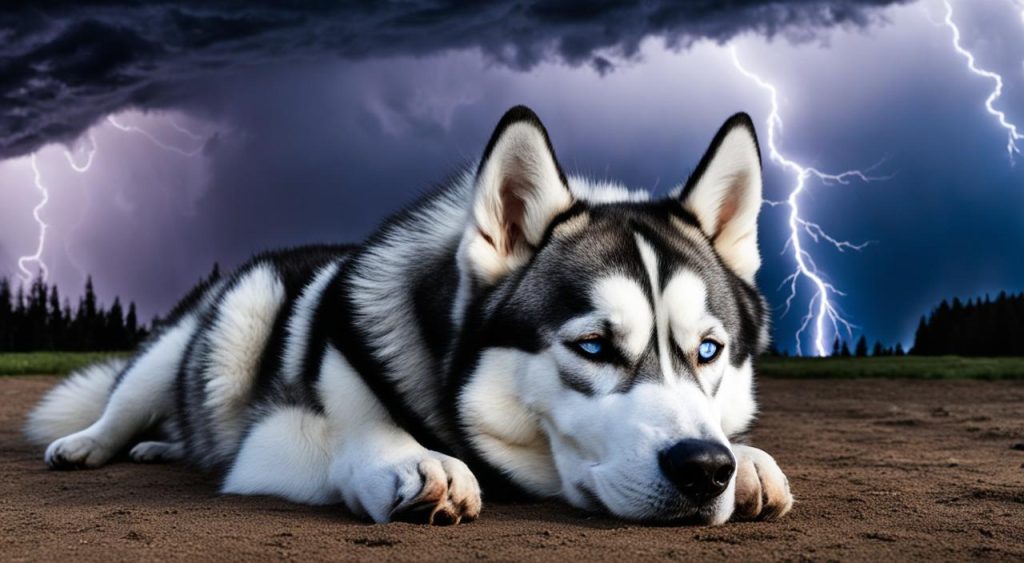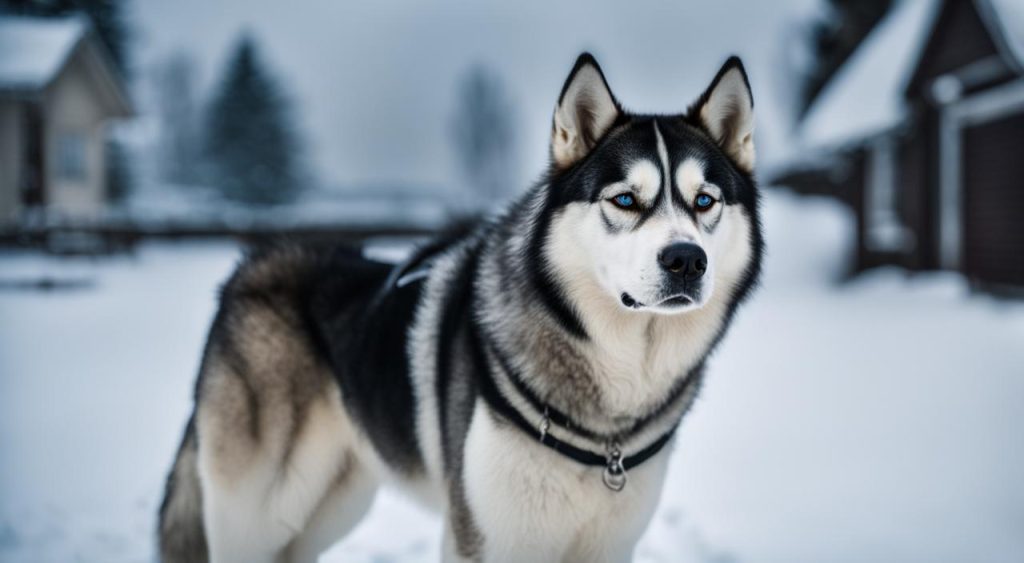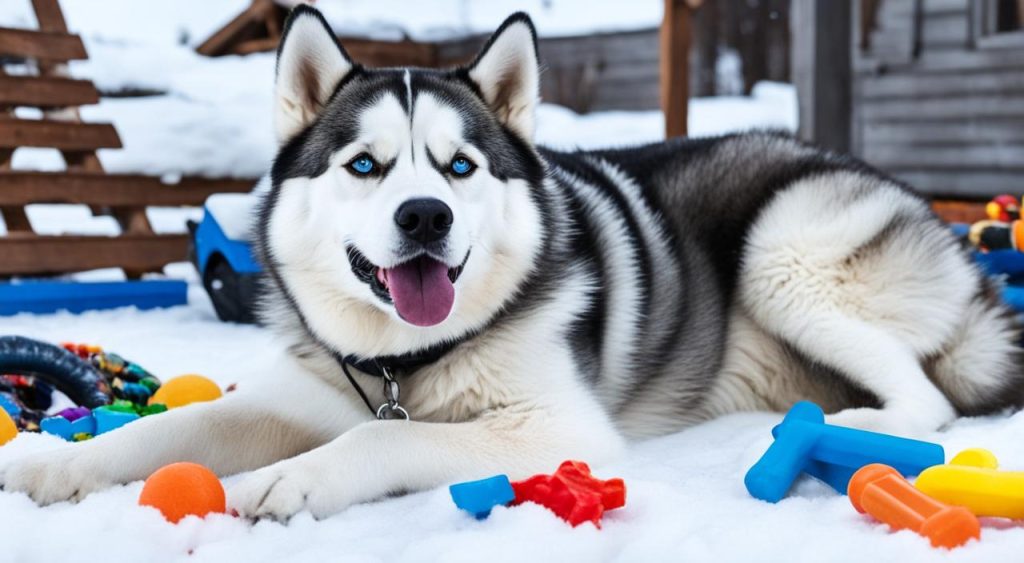When it comes to emotional dogs, huskies definitely take the lead. These majestic creatures are known for their expressive behavior and strong emotional nature. Understanding why huskies are so emotional can help you build a stronger bond with your furry friend and provide them with the care they need.
Huskies’ emotional traits are rooted in their ancestral connection to wolves. They have retained their pack mentality, which makes them highly sensitive to their environment and the emotions around them. This sensitivity often translates into dramatic behavior that can be both captivating and challenging to navigate.
It’s important to recognize that huskies’ emotional behavior serves a purpose. It allows them to communicate with their pack and express their needs and desires. By understanding and respecting their emotional nature, you can create a harmonious and fulfilling relationship with your husky.
In this article, we will explore the reasons behind huskies’ emotional nature and provide insights into how you can better understand and manage their emotions. From their dramatic essence to their emotional sensitivity, we will delve into the intricate world of husky emotions and equip you with the knowledge to navigate it.
Key Takeaways:
- Huskies’ emotional behavior is a result of their expressive instincts and strong pack mentality inherited from wolves.
- Understanding huskies’ emotions is crucial for building a strong bond and providing the care they need.
- Huskies’ emotional sensitivity requires consistent training, clear boundaries, and positive social experiences to manage.
- Positive reinforcement techniques and engaging activities are effective in training and channeling huskies’ emotional behavior.
- Debunking common myths about huskies can lead to a deeper understanding of their true nature and foster a more fulfilling relationship.
The Dramatic Essence of Huskies
Huskies possess a dramatic essence deeply ingrained in their ancestral heritage and instincts. Their expressive communication through vocal symphonies and body language allows them to convey their emotions and connect with their pack in profound ways.
These majestic dogs have an innate need for mental and physical engagement, necessitating activities that provide them with channels to positively channel their abundant energy.
Emotional Sensitivity in Huskies
Huskies are known for their emotional sensitivity, which stems from their deep connection to their pack and their acute awareness of the emotions and social dynamics within it. Their dramatic behavior often serves as an expression of their emotional sensitivity, reflecting their immediate response to their environment.
The pack influence plays a significant role in shaping the emotions of huskies. As highly social animals, they rely on the pack for support, guidance, and emotional cues. The dynamics within the pack directly impact the emotional state of individual huskies. If there is tension, conflict, or excitement within the pack, the emotional sensitivity of huskies can heighten, resulting in more intense or dramatic behavior.
To effectively manage emotional huskies, it is crucial to provide consistent training that establishes clear boundaries and reinforces positive behaviors. This helps them understand the expected emotional responses and reinforces appropriate ways to express their emotions. Socialization is also vital for emotional huskies, as positive social experiences can help them build confidence and develop healthy emotional responses in different situations.
“Understanding the emotional sensitivity of huskies and the impact of the pack on their emotions is key to managing their behavior and fostering a healthy emotional state.”
By recognizing and addressing the emotional needs of huskies, owners can create a harmonious environment that supports their emotional well-being. This includes providing mental and physical stimulation through engaging activities tailored to their breed instincts and personality. Regular exercise, interactive play, and challenging tasks can help channel their energy in a positive and productive way, reducing the likelihood of negative emotional outbursts.
In conclusion, emotional sensitivity is a defining characteristic of huskies, influenced by the dynamics within their pack. Understanding, acknowledging, and effectively managing their emotions is crucial for a balanced and fulfilling relationship with these remarkable dogs. Through consistent training, clear boundaries, positive social experiences, and engaging activities, husky owners can create a supportive environment that nurtures their emotional well-being.
Training and Managing Emotional Huskies
To effectively train and manage emotional huskies, it is crucial to understand their unique nature and emotional needs. These magnificent dogs require a special approach that focuses on positive reinforcement techniques and engaging activities to channel their energy in a positive way.
Positive reinforcement training is highly effective when it comes to emotional huskies. By utilizing rewards, treats, and verbal praise, you can motivate and encourage desired behaviors. This type of training not only strengthens the bond between you and your husky but also helps them understand what is expected of them.
Engaging in activities that provide mental and physical stimulation is key to managing the emotional behavior of huskies. Agility exercises, obedience training, and interactive games are excellent options for these energetic dogs. These activities keep them physically active, mentally stimulated, and provide an outlet for their emotions.
“Training emotional huskies requires patience, consistency, and a deep understanding of their unique needs. By using positive reinforcement techniques and engaging activities, you can help them become well-rounded, confident, and emotionally balanced dogs.”
It’s important to note that each husky is unique, and their emotional needs may vary. Paying close attention to their individual personalities, body language, and responses is essential throughout the training and management process. Remember, consistency is key.
By understanding the emotions and needs of your husky, employing positive reinforcement techniques, and engaging in stimulating activities, you can successfully train and manage your emotional husky. Building a strong bond and creating a positive environment will result in a happy and well-adjusted husky companion.
Debunking Husky Myths
Despite their dramatic behavior, huskies are not attention-seekers but intelligent dogs craving mental stimulation. They are not untrainable as some believe, but require positive reinforcement-based training. Understanding and embracing the true nature of huskies can lead to a deeper and more fulfilling relationship with these remarkable dogs.
One common misconception about huskies is that their dramatic behavior is a result of seeking attention. In reality, huskies are highly intelligent dogs with a strong need for mental stimulation. Their dramatic displays of behavior are often their way of expressing their intelligence and engaging with their environment. They thrive when given tasks that challenge their minds and keep them mentally stimulated.
Another myth about huskies is that they are untrainable. While it is true that huskies have an independent streak and may require more patience and consistency in training, they are far from being untrainable. The key to successfully training a husky lies in utilizing positive reinforcement techniques that reward good behavior. By focusing on positive reinforcement and creating a bond based on trust and reward, huskies can be trained effectively.
Understanding and embracing the true nature of huskies is crucial for building a strong and fulfilling relationship with these remarkable dogs. Huskies are highly intelligent, emotionally sensitive, and have a strong pack mentality. Recognizing and respecting their instincts and needs can lead to a harmonious and mutually rewarding bond. By providing them with mental stimulation, engaging activities, and positive training methods, husky owners can debunk the myths and discover the true nature of these magnificent dogs.
Conclusion
Huskies’ emotional nature and dramatic behavior are a fascinating reflection of their expressive instincts, emotional sensitivity, and deep-seated pack mentality. By understanding and managing their emotions, you can build a stronger bond and create a harmonious environment for your husky.
Consistent training is crucial in nurturing emotional huskies. Positive reinforcement methods that involve rewards, treats, and praises work effectively in shaping their behavior. Remember to set clear boundaries and provide ample mental and physical engagement to channel their energy positively.
In debunking common myths about huskies, we can embrace their true nature. Contrary to popular belief, huskies are not attention-seekers but intelligent creatures requiring mental stimulation. With patience and dedication, you can cultivate a deep understanding of their emotional intricacies, allowing you both to thrive in your relationship.
As you embark on this remarkable journey with your emotional husky, always remember that their dramatic behavior and expressive traits are what make them truly special. Embrace their unique nature and provide the love and care they need. By doing so, you’ll be rewarded with an unbreakable bond and a loyal companion who will bring endless joy to your life.





